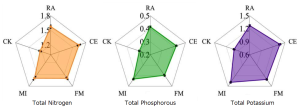A group from Guangxi Colleges and Universities Key Laboratory of Crop Cultivation and Tillage, College of Agriculture, Guangxi University, Nanning, Guangxi, China, etc. has reported effects of Arbuscular mycorrhizal fungi (AMF) inoculation on Maize plants.
https://www.ncbi.nlm.nih.gov/pmc/articles/PMC8817564/
Five treatments were designed:
maize plants inoculated with Rhizophagus aggreratus were recorded as RA,
those inoculated with Claroideoglomus etunicatum were recorded as CE,
those inoculated with Funneliformis mosseae were recorded as FM,
those inoculated with three species of AMF were recorded as MI, and
those without AMF were recorded as CK.
The total N, P and K levels of the maize plants (g plant-1)were measured and analyzed during the harvest period.
It was clearly shown that the accumulation of N, P and K in MI was the highest, and the accumulation capacity of N, P and K in maize symbiosis with AMF was significantly higher than that in CK as shown below.
Different AMF inoculations had different effects on maize root exudates at different growth stages. In this experiment, 10 kinds of organic acids were isolated from maize root exudates.
From the total level of organic acids secretion in the whole maize growth period, the followings were found,
FM promoted the secretion of p-hydroxybenzoic, p-coumaric and caffeic acid,
CE promoted the secretion of syringic acid,
RA promoted the secretion of chlorogenic and succinic acid, and
the levels of protocatechuic, vanillic, citric and ferulic acid were lower than those of CK.
Some studies have shown that p-hydroxybenzoic acid can reduce the number of Fusarium and the occurrence of Fusarium wilt, vanillic acid can inhibit soil-borne pathogens and reduce soil-borne diseases, vanillic acid can inhibit the growth of Fusarium wilt, caffeic acid plays an important role in inhibiting soil-borne pathogens, caffeic acid can directly inhibit the growth of Ralstonia solanacearum, and ferulic acid has strong allelopathy and can inhibit the growth of plant roots.
So, AMF may alleviate soil-borne diseases by increasing the levels of p-hydroxybenzoic, vanillic and caffeic acid in plant root exudates. The role of these organic acids in maize growth and their impact on maize growth after AMF symbiosis must be further studied.

